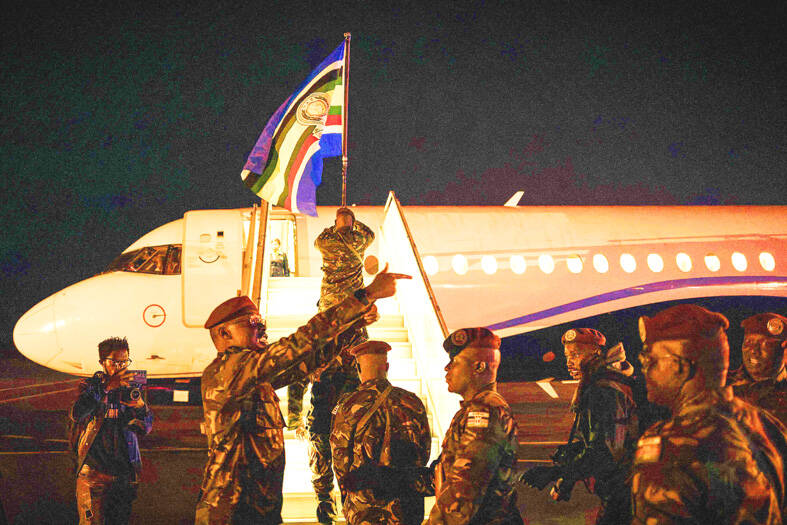The East African Community (EAC) regional force yesterday morning began its withdrawal from the Democratic Republic of the Congo (DR Congo) after Kinshasa deemed it ineffective and refused to renew its mandate.
The regional bloc first deployed troops in the violence-plagued region in November last year after the resurgence of the M23 rebel group.
DR Congo authorities at the time invited the EAC to deploy its forces to free the areas taken by the rebels.

Photo: AFP
That deployment was thrown into doubt after Congolese President Felix Tshisekedi accused the force of cohabiting with the rebels rather than forcing them to lay down arms.
Following a summit on Nov. 25, the EAC announced that the DR Congo would not renew the mandate of the regional force beyond Friday.
A first group of about 100 Kenyan soldiers from the regional force — which also includes Ugandan, Burundian and South Sudanese soldiers — left from Goma International Airport bound for Nairobi, said a spokesman for the force on the ground who did not provide more detail on further withdrawals.
Agence France-Presse journalists saw their plane taking off shortly after 5am.
Fighting continues between the M23 group and the DR Congo army, supported by militia who call themselves “patriots.”
On Oct. 24, a Kenyan soldier from the regional force was killed by shrapnel.
Numerous armed groups and other militias have been active for three decades in the east of the DR Congo, a legacy of the regional wars that broke out during the 1990s and 2000s.
The UN stabilization mission to the DR Congo, MONUSCO, has been present in the country since 1999, in addition to the EAC’s force, but it has also been accused of ineffectiveness, with Kinshasa calling for its “accelerated” departure from January.
MONUSCO comprises about 14,000 peacekeepers, deployed almost exclusively in the east of the country.
General elections are scheduled for Dec. 20 in the DR Congo, a vast country of about 100 million inhabitants.
Tshisekedi, in power since 2019, is standing for a second five-year term, but due to the ongoing fighting against M23, the elections would not be held in two territories in eastern North Kivu province.

When Shanghai-based designer Guo Qingshan posted a vacation photo on Valentine’s Day and captioned it “Puppy Mountain,” it became a sensation in China and even created a tourist destination. Guo had gone on a hike while visiting his hometown of Yichang in central China’s Hubei Province late last month. When reviewing the photographs, he saw something he had not noticed before: A mountain shaped like a dog’s head rested on the ground next to the Yangtze River, its snout perched at the water’s edge. “It was so magical and cute. I was so excited and happy when I discovered it,” Guo said.

Chinese authorities said they began live-fire exercises in the Gulf of Tonkin on Monday, only days after Vietnam announced a new line marking what it considers its territory in the body of water between the nations. The Chinese Maritime Safety Administration said the exercises would be focused on the Beibu Gulf area, closer to the Chinese side of the Gulf of Tonkin, and would run until tomorrow evening. It gave no further details, but the drills follow an announcement last week by Vietnam establishing a baseline used to calculate the width of its territorial waters in the Gulf of Tonkin. State-run Vietnam News

TURNAROUND: The Liberal Party had trailed the Conservatives by a wide margin, but that was before Trump threatened to make Canada the US’ 51st state Canada’s ruling Liberals, who a few weeks ago looked certain to lose an election this year, are mounting a major comeback amid the threat of US tariffs and are tied with their rival Conservatives, according to three new polls. An Ipsos survey released late on Tuesday showed that the left-leaning Liberals have 38 percent public support and the official opposition center-right Conservatives have 36 percent. The Liberals have overturned a 26-point deficit in six weeks, and run advertisements comparing the Conservative leader to Trump. The Conservative strategy had long been to attack unpopular Canadian Prime Minister Justin Trudeau, but last month he

Four decades after they were forced apart, US-raised Adamary Garcia and her birth mother on Saturday fell into each other’s arms at the airport in Santiago, Chile. Without speaking, they embraced tearfully: A rare reunification for one the thousands of Chileans taken from their mothers as babies and given up for adoption abroad. “The worst is over,” Edita Bizama, 64, said as she beheld her daughter for the first time since her birth 41 years ago. Garcia had flown to Santiago with four other women born in Chile and adopted in the US. Reports have estimated there were 20,000 such cases from 1950 to